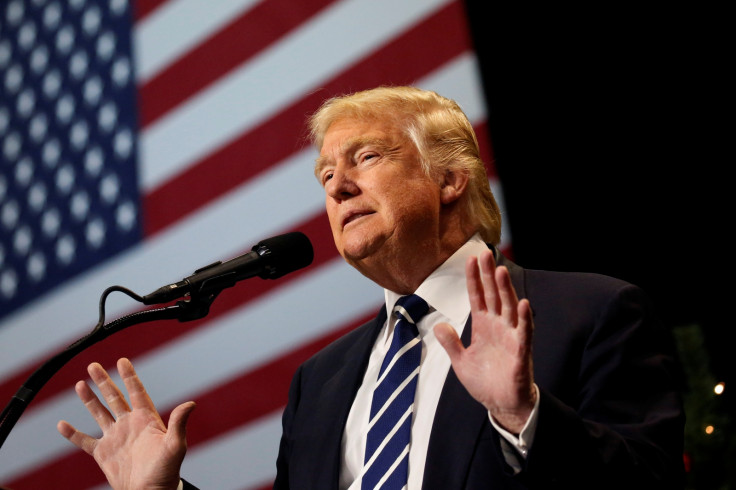Russia 'certainly' has Donald Trump dossier ready to deploy at most opportune moment
US has no firm understanding of what hackers collected on American political leaders — including Republicans

Russian hackers have likely compiled a dossier on President-elect Donald Trump that could be leaked in the coming months, according to a Russia expert that used to sit on the National Security Council.
"I think they most certainly have something on Trump," said Thomas Graham, managing director at Kissinger Associates — the consulting firm of former Secretary of State Henry Kissinger and former Intelligence Advisory Board chair Brent Scowcroft. Graham spoke Friday (16 December) at an event in London held at the Royal Institute of International Affairs.
"I don't know what it is," Graham said, "but I think certainly more is going to be leaked and made public in the months ahead. There's got to be a dossier on Trump." He added American politicians "can't assume that the Russians have released the best stuff that they have".
"The question that we have to answer is what are they going to release, at what time, with what purpose in the US?" he asked. Graham sat on the US National Security Council from 2004 to 2007 under George W Bush, serving as a Russian specialist.
"We have no firm understanding what they might have collected across the board on various political leaders — and that includes various Republicans," he said of Russian intelligence-linked hackers.
Late Thursday (15 December) the Republican National Committee (RNC) told the Wall Street Journal that Russian hackers had attempted to breach the party's computers over the summer, but were blocked by an email spam filter. The Russian intelligence-linked hackers also broke into Democratic National Committee emails and others from Hillary Clinton's campaign chair.
Those emails were published by WikiLeaks in the latter days of the 2016 campaign. A research document on Trump compiled by the Democrats and dated 19 December 2015 was also released in the leaks.
Other Republicans, such as former UN ambassador John Bolton, have obliquely suggested that the RNC was hacked. "It is not at all clear to me, just viewing this from the outside, that this hacking into the DNC and the RNC computers was not a false flag operation," Bolton said during an interview on Fox News on Monday (12 December).
In September the Republican chair of the House homeland security committee, Mike McCaul, said that he "misspoke by asserting that the RNC was hacked" following a CNN interview in which he said the "Russians have basically hacked into both parties at the national level".
No emails or documents from the RNC were ever leaked. But emails from several high-level Republicans, including former Secretary of State Colin Powell, John McCain, former Vice President Dick Cheney and former President George HW Bush appeared on the site DCleaks.com.
Republican Senator Lindsey Graham, who is helping lead a bipartisan review of Russian hacking against American government targets, appeared on CNN on Wednesday (14 December) claiming Russia had hacked his campaign email account.
Russia's hacking of political party officials has "an element of payback," said Thomas Graham. "There is a widespread view in Russia that much of what they're doing is what the West has done to them over the past 25 years." It's hard to argue, he said, that the US "haven't interfered in Russian domestic politics [but] it's been done very overtly", not covertly by intelligence agencies.
Russia's intent behind the hacks, he said, appears to be to weaken the US. But "the leaks make it much more difficult to have a normal relationship with Russia", he added, saying there is "little understanding" amongst Russia's leadership how the hacks are perceived in the US.
"There is still very deep suspicion of the Russians within the national security apparatus," he said. "If you turn to the Pentagon or the Intelligence Community for options on how to deal with Russia, the top of the list are not going to be ones that are focused on how we can co-operate."
Yet co-operation is in the mutual interest of both Russia and the US, Graham insisted. Russia is keen on having sanctions lifted that were placed on some of its highest officials and companies by President Obama in 2014 following its annexation of the Crimean region of Ukraine. Europe extended its own economic sanctions on Russia for another six months 16 December.
If Russia was approached firmly, a skilled negotiator could strike a balance between lifting sanctions gradually and getting Russia to withdraw from Crimea, Graham said.
Trump has downplayed the hacks and resisted tying them back to Russia. In tweets this week, and in a Time magazine interview last week, he said he thought the intelligence community had been politicised. Russia has responded positively to that and to the fact that Trump nominated Russia-friendly Exxon CEO Rex Tillerson to be his Secretary of State. Russian President Vladimir Putin said soon after that he is "ready at any moment" to meet with Trump.
"I think we should give [Trump] an opportunity to develop the positive objectives that he may have," said Henry Kissinger in an interview after he met with the president-elect in mid-November.
"The relationship with the west is in a dangerous phase, and there's potential for conflicts spiralling out of control," Graham urged, "because we're not having the kinds of conversations we want."
© Copyright IBTimes 2025. All rights reserved.






















